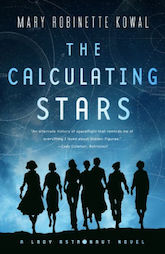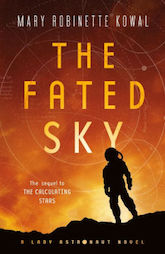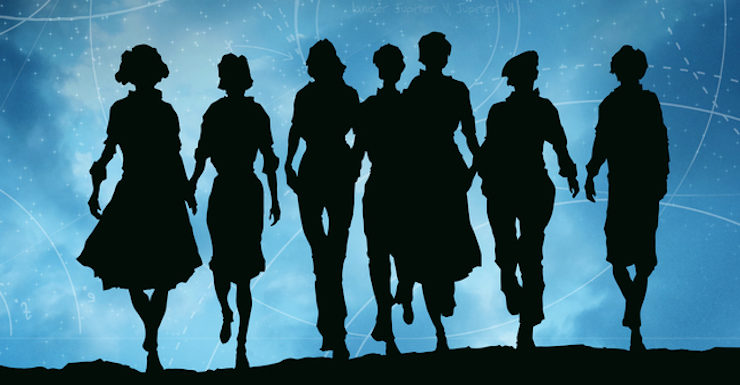Mary Robinette Kowal’s novelette “The Lady Astronaut of Mars” won the 2014 Hugo Award in its category. Now Tor Books brings us a pair of novels about Elma York’s life before her final mission: even before Mars.
The simplest way to describe Mary Robinette Kowal’s The Calculating Stars and its sequel, The Fated Sky, is as an alternative history of the American space programme. But that’s not all it is: it’s a story about a young Jewish woman with an anxiety disorder using all the tools at her disposal to gain a place for herself in the astronaut programme, and building coalitions with other women to bring them with her. (It’s also a story about how that young woman, Elma York, benefits from white privilege and puts her foot in it with thoughtless bigoted assumptions, and how she keeps trying to learn better.)
Buy the Book


The Calculating Stars
In 1952, a giant meteorite strikes earth just off the coast of Maryland, USA. The resulting cataclysmic explosion (and tidal wave) destroys much of the American east coast, including Washington DC. Elma and her husband Nathaniel survive due to being far away, on holiday in a mountain cabin, but Elma loses many of her surviving relatives to the tidal wave. Worse than the devastation of the initial strike, however, are the results that Elma and her brother, meteorologist Herschel, calculate that the strike will have on the earth’s atmosphere: after a brief period of extreme cold temperatures, the atmosphere will heat to the point where it will become uninhabitable for human life (just like our climate change problem, but even faster), and there’s no way to tell whether mitigation efforts will work until it’s too late.
In consequence of Elma and Herschel’s calculations, the US government invests in space exploration with an eye to space colonisation. The effort becomes international, and Elma’s mathematical skills (and her husband’s role as chief engineer) mean she’s guaranteed a place in the International Aerospace Coalition’s space programme as a calculator. But Elma’s a pilot, too, and she’s determined to win a place for herself to fly.
The Calculating Stars charts Elma’s journey to becoming an astronaut, as she struggles with sexism and bigotry (the bigotry includes her own assumptions about black men and women), and with her own anxiety and intense dislike of the spotlight, to win a place for herself and for other women as real astronauts.
The Fated Sky continues the story of The Calculating Stars, following Elma through selection for the first demanding multi-year mission to Mars, in which bigotry and public relations continue to play a large role—and on into space, separated from her husband and any community bar the one that comes with her by unimaginable distances. With everything about the mission held in fragile balance, Elma must negotiate her steps carefully to help as many people as possible survive to go home again.
Buy the Book


The Fated Sky
Kowal’s writing is smooth and compelling, and her characters come to life on the page. Her enthusiasm for the analogue details of pre-mechanical-computing spaceflight is detailed and infectious. But though Kowal doesn’t portray the past as free from racism and bigotry, her vision of a post-cataclysmic United States in the 1950s is fundamentally optimistic and invested in a progressive vision of human history. It seems a little unbelievable that a country still under the grip of laws that partially inspired Nazi Germany (Jim Crow) and dealing with an enormous economic and human toll would be as susceptible to moral suasion and Elma’s particular brand of advocacy as Kowal’s alternative past.
But perhaps that’s the point: Kowal’s novels are kind, about—largely—decent people, most of whom aren’t (or, at least, who don’t think of themselves as) personally strongly racist even if they’re pretty sexist, and who learn to do better, or at least keep quieter. It’s an optimistic vision that does its best to make you feel good about space and the possibilities of human achievement without pretending everything is easy for everyone, and that’s… something.
I’d like to be more enthusiastic about these novels. I enjoyed them a hell of a lot. But right now, I’m finding it difficult to see optimistic visions of past futures with much sympathy, when I so desperately want optimistic visions of the future past today.
Liz Bourke is a cranky queer person who reads books. She holds a Ph.D in Classics from Trinity College, Dublin. Her first book, Sleeping With Monsters, a collection of reviews and criticism, was published in 2017 by Aqueduct Press. It was a finalist for the 2018 Locus Awards and is nominated for a Hugo Award in Best Related Work. Find her at her blog, where she’s been known to talk about even more books thanks to her Patreon supporters. Or find her at her Twitter. She supports the work of the Irish Refugee Council, the Transgender Equality Network Ireland, and the Abortion Rights Campaign.










